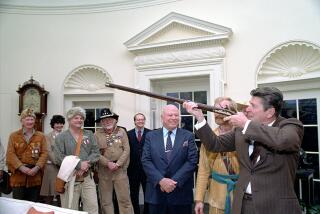Assault on the American Worker
- Share via
Ernest Conine is correct in his article (Editorial Pages, Jan. 8), “Assault on the American Worker,” to spot inordinate greed operating in the American marketplace, but he fails to explore the depths of the problem. He ignores the Reagan Administration’s contribution to the current explosion of corporate greed and he glosses over some fundamental differences between the United States and Western Europe that have facilitated varying degrees of success in the control of greed.
Even allowing Conine to rely on the weak evidence of a Harris Poll, some scant state legislation, and an obscure quotation from a former Labor secretary, I am most shocked by the main thrust of his argument: his assumption that “any excesses committed by business tend to generate countervailing pressures from the federal government” and that therefore we are headed for “another swing of the pendulum toward excessive government interference.”
Far from being the automatic reactions that Conine implies they were, the reforms in social policy he mentions came about through conscious efforts to subvert the deeply ingrained American tradition of free enterprises. Many of them were the products of Franklin D. Roosevelt’s bold commitment to “the forgotten man” in the New Deal, his belief that the duty of government was to meet social problems with social controls that often mounted to an attack on the natural business cycle.
Whereas most Western Europe countries developed fuller social programs earlier in the century, the United States clung to the myth of the self-made man as long as it could. President Reagan threatens to revive this dangerous myth, thereby returning the “forgotten man” to his proper place in our consciousness.
SARAH GOLDSTEIN
Van Nuys


